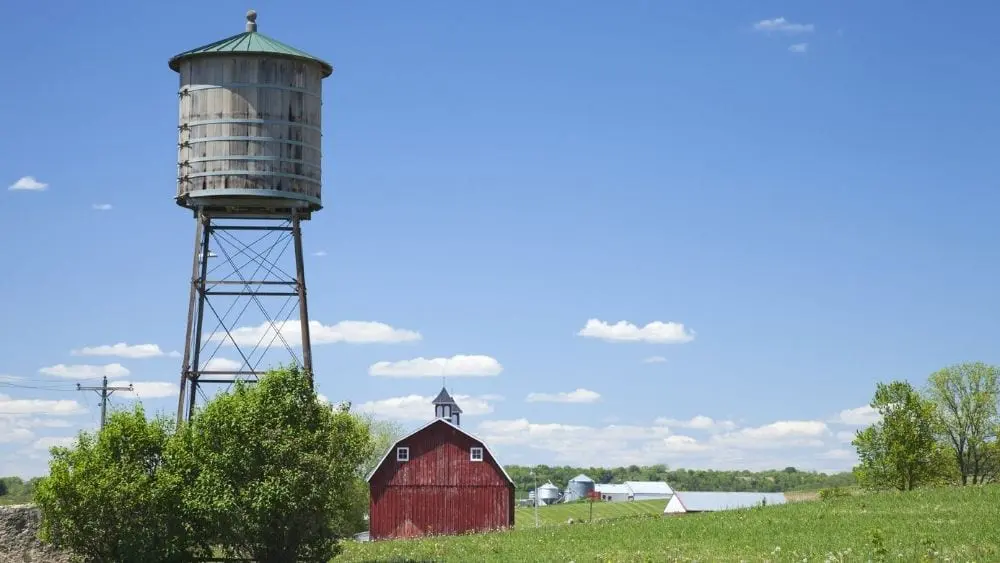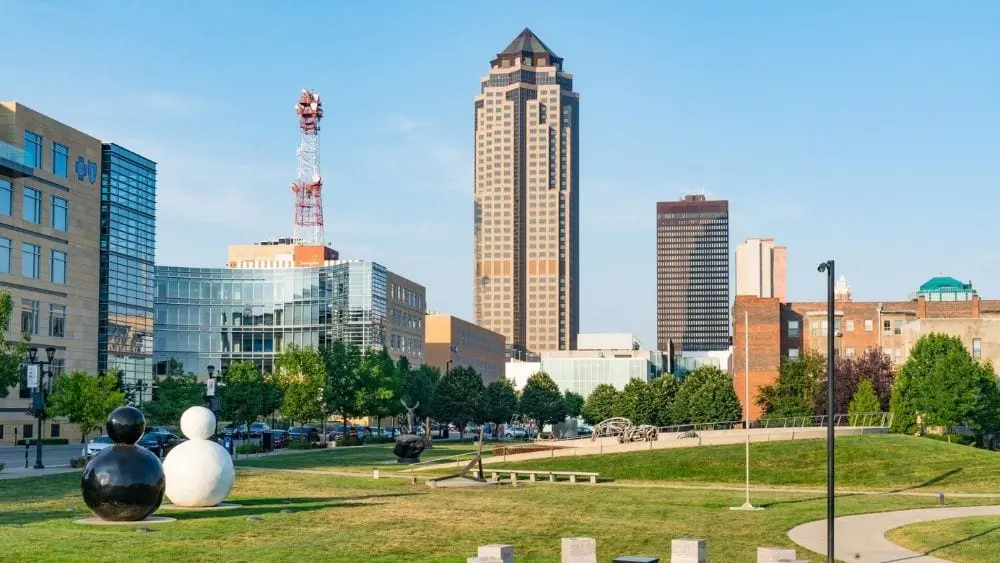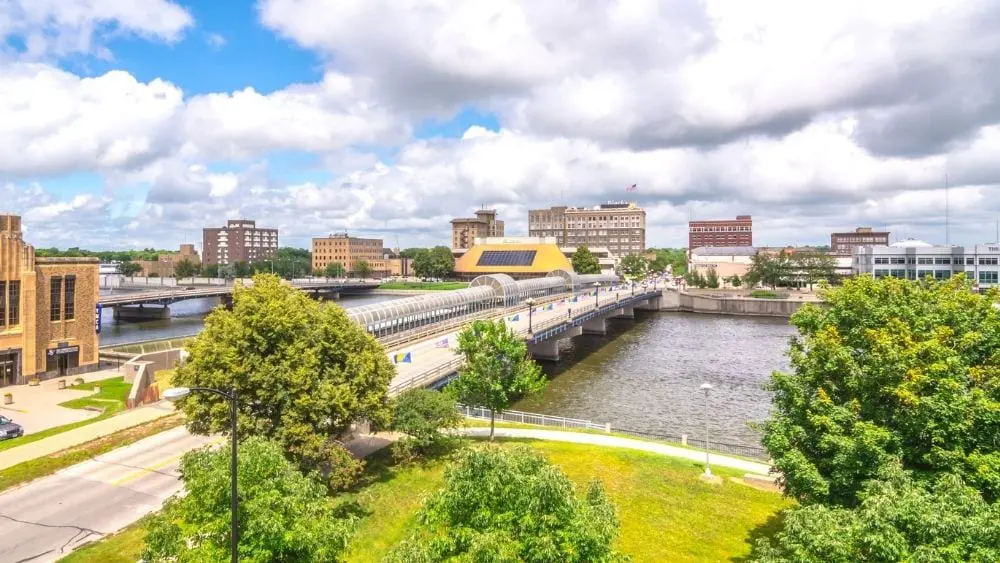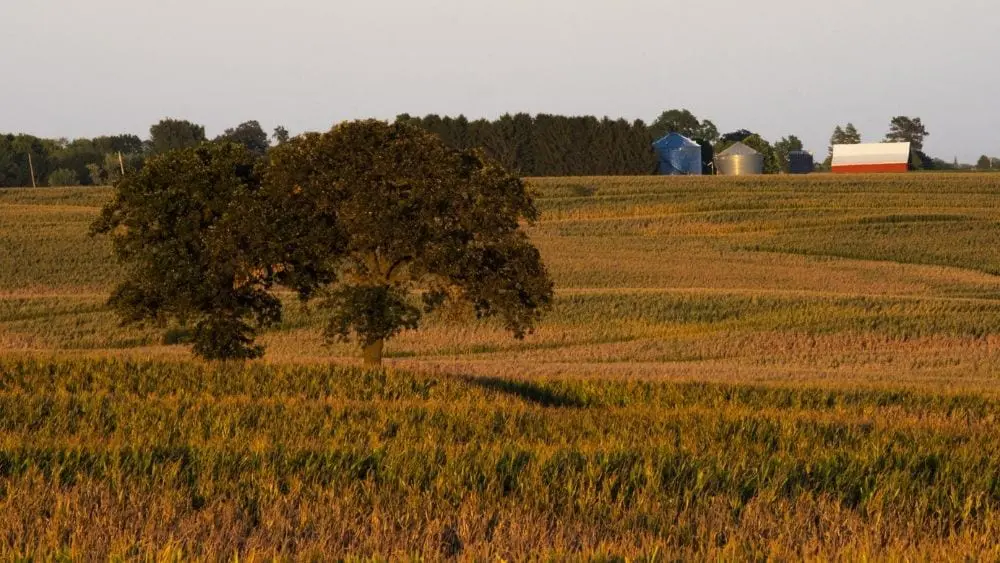
Whether you plan to build a house in one of Iowa’s largest cities or in a rural area, building a house in this state typically costs less than it does in most of the U.S. According to GoBankingRates, the cost to build a house in Iowa is estimated at $155,686, making it the seventh least expensive state in which to build a house. But the estimated hourly labor cost in Iowa is relatively high at $17.23, which makes building a house in Iowa a little more expensive that it would be otherwise.
The price you pay to build a house in Iowa depends on numerous factors such as the location, size, and design you choose. Nearly half (43 percent) of Iowa residents live in rural areas, according to the Census Bureau. Typically, it costs more to build a house in a city such as Des Moines, Cedar Rapids, or Davenport than in a rural area.
Custom vs. Production Homes
An important factor that will affect the price is whether you’re building a custom home or what’s known as a production home. A production home refers to one built on land a developer owns, usually in a cluster of homes or a planned community. You can also build a modular home in Iowa.
Custom homes are usually more costly to build than production homes because they require an architect or a design/build firm. Typically, the buyer pays separately for the land, the permits, the design, and the construction of a custom home. When you build a production home, your builder will usually finance everything upfront, and you’ll pay one price for the house.
This article details how to build a production home in Iowa.
Step-by-Step Process to Build a House in Iowa

From the time you sign a contract to build a house in Iowa until your moving day typically takes about seven months.
To build a house in Iowa, you’ll need to take the following steps:
1. Budget for your new home
Well before you sign a contract to start the step-by-step process to build a home in Iowa, you’ll need to make a financial plan and decide how much you can afford to spend. Consulting with a lender is part of the process, but it’s best to begin with your personal evaluation of what you’re comfortable spending. Keep in mind that your housing payment includes your mortgage principal and interest, taxes, insurance, and more than likely, homeowner association dues.
The amount you’ll borrow depends on the price of the house and how much cash you invest upfront. Review your assets to decide how much money is available and how much you want to use for your down payment and closing costs. If you own a house that you’ll sell, get an estimate of what your proceeds may be from the sale if you want to use them toward your down payment.
The next step is to meet with a lender. A lender can review your income, assets, debts, and credit history to generate a preapproval for the maximum amount you can borrow. Your lender can also advise you about loan programs and anything you may need to do to improve your credit score. You can always change lenders later in the process of building a house in Iowa.
When you are working on obtaining the financing for your home in Iowa, you can ask the lender whether you qualify for any special homebuyer assistance programs such as funds for a down payment or a low-interest loan.
The price per square foot to build a house in Iowa averages $107 to $428, which would be $267,500 to more than $1 million for a 2,500 square foot house. Typically, materials represent about 50 percent of the cost to build a house in Iowa and labor costs are 30 percent to 40 percent of the cost.
Numerous factors influence the price you’ll pay to build a house in Iowa, including the location, the builder, the size of the house, and the materials you choose. Production builders often have the ability to buy appliances and materials in bulk, which could potentially lower the cost of items such as windows and lumber for framing.
Homeowner’s insurance in Iowa is lower than the national average, costing an average of $2,027 per year, according to Insurance.com, which is 11 percent below the national average of $2,305. However, property taxes are higher in Iowa than in many other states. The average property tax rate in the state is 1.53 percent, compared to the 1.07 percent national average, which makes it the 11th highest state for property taxes, according to SmartAsset.com.
Homeowner association dues depend on the size of your community and the services and amenities provided. When you gather information about each community, you can ask for an estimate of homeowner association fees.
2. Choose your builder and community

Now that you have a budget in mind, you can start searching online for a community and a builder. Generally, you can narrow your choice by location and price range and then explore the websites of each community and each builder within that community to develop a list of places to visit in person. Look for community information such as planned amenities and proximity to shops, schools, recreation, and anything else important to you. Most websites include floor plans, virtual tours, 3D models, photos, and renderings of the homes. You can find reviews of builders at TrustBuilder®.
When you visit communities, you can talk to sales professionals and residents about what it’s like to live there and discuss floor plans and amenities.
3. Line up your financing
After you choose the builder and the community, it will be time to sign a purchase contract. Typically, you’ll need to make a deposit when you sign the contract.
If your builder has a financial arm to the business, you may be asked to obtain loan approval from that lender. Some builders offer a list of preferred lenders. Either way, you may want to work with a lender with a relationship to the builder for easier communication. Some builders offer an incentive to work with their preferred lender and title company such as paying closing costs or for an upgrade. It’s smart to compare rates and terms with another lender to be sure you’re getting the best possible financing.
Besides the cash for your down payment, you’ll likely need to pay some or all of the closing costs, which are typically 2 percent to 5 percent of the sales price. You may also need to pay cash for structural options or unusually costly upgrades.
4. Choose your lot, floor plan, and upgrades
Perhaps the most exciting part of building a house in Iowa is choosing your lot and floor plan. You can work with the sales professionals on-site to determine which lots are available for the floor plan you want, since your floor plan might not fit on a particular site or the number of similar homes on one block is limited.
Ask about plans for the surrounding land to be sure the view won’t be obstructed by future development and that the amenities you want will be nearby.
Find out which features are included in the base price and how many choices you have for upgrades. Some builders offer complete personalization while others limit choices to packages at different price ranges. Usually, you’ll need to make your choices early in the construction process.
5. Be aware of permitting and inspections
While Iowa doesn’t have a mandatory statewide building code, local jurisdictions can establish their own building codes and permitting processes. Your builder will follow the codes and take care of all permits, inspections, and insurance requirements. If you want to hire your own inspector for your home, you can consult with your builder to determine the best time to have an inspector on the premises.
6. Consider the local climate

Residents in Iowa experience heavy rainfall, intense storms, and summer heat waves. You and your builder can talk about whether there are design changes or materials you should choose to mitigate these issues. Another resource with state-specific information is the Buyers Guide to Resilient Homes.
Construction Period
While the step-by-step process to build a house in Iowa takes about seven months, shortages of labor or materials can extend the timeline, and even weather can have an impact. Stay in close contact with your builder and your lender while your home is under construction to ensure your financing is locked in and you’re ready to move when your new home is complete.

Michele Lerner is an award-winning freelance writer, editor and author who has been writing about real estate, personal finance and business topics for more than two decades.
 Everything to Know About Home Equity Lines of Credit
Everything to Know About Home Equity Lines of Credit